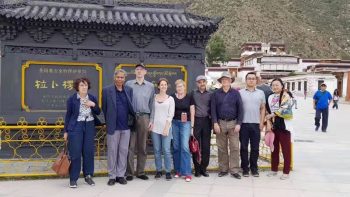Following the brief outline reported in July newsletter ( https://nzchinasociety.org.nz/president-joins-delegation-to-tibetan-region-and-xinjiang/) I have written more detailed reports on these issues.
I have reported the visits and findings that were presented to the delegation as accurately as possible. At minimum a balance to reports in western media, and in particular to counter the negative rhetoric, is required.
Tibetan issues
For Tibetan issues, the improvements being brought to standards of living need to be received for what they are – Tibetans living in Tibetan regions in China are happy to become middle class, while continuing their traditional culture and practice of Tibetan Buddhism.
With the discussions in Beijing, Lanzhou, and our visit to Gannan Tibetan Autonomous prefecture in Gansu, we could see that the changes being brought to areas on the Qinghai-Tibetan plateau were making progress with poverty reduction and environmental protection in this fragile region. While bringing some changes to traditional ways of life, it was also facilitating retention of traditions. The Tibetans as beneficiaries appeared to welcome the progress made in improving their standards of living.
For full report go to Tibetan Issues
Xinjiang issues
In Xinjiang, the misrepresentation of the truth is unhelpful in understanding the role China has in contributing to global counter-terrorist effort, and the presentation of human rights abuses needs to be countered, when the vast majority of the people in Xinjiang have their right to education, employment and religious freedom and a safe society free from terrorist attack has been achieved
I have visited Xinjiang twice before when accompanying NZCFS tour groups. In particular the October 2017 visit was challenging because of the level of security we were all subjected to. In some respects, our tour group suffered longer delays at check points than locals, but I now see that is because our lack of ID cards did not facilitate quick throughput at check points. This visit, albeit just to Turpan and Urumqi, showed a much more relaxed society without fear or resentment. The People’s Square in Urumqi on Saturday night was a site of people dancing and singing in numerous groups. Our hosts said there were 18,000 people recorded as being there that night. Certainly, at least 10,000 were enjoying a balmy evening in a relaxed atmosphere.
For the full report go to Xinjiang Issues
Balanced reading
Links to some alternative perspectives on Xinjiang affairs and human rights issues are copied here Media Links for some Chinese perspectives, July 2019
They are from a range of commentators, both Chinese and Western, and are available in China Daily, Global Times, and GGTN (China Global Television). All were available during the brief period of the week of the visit, July 7 to 14, and available online from within China. Western newspapers, including Washington Post, and NZ Herald, were also available, presenting a western spin on the same stories.
Overall, and specifically wrt Xinjiang issues of human rights and freedom of religion, I have a very high degree of respect for the understanding given by my fellow delegate S.M Hali, an ex-Pakistan Airforce Officer, retired to study journalism to doctorate level, now an international commentator. A practicing Muslim, he has been visiting Xinjiang since 1974, and in 2017 researched the freedom to practice Islam in Xinjiang, Ningxia and other provinces to find no restrictions, but was firm in the view that extremism and terrorism had no place in true Islam.
Dave Bromwich August 12 2019




